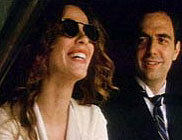|
|
|
|
A
Heart Elsewhere
|
 |
|
Pupi Avati's A Heart Elsewhere makes a fascinating double with Claude Berri's The Housekeeper (2002). Both are subtle European art films about mismatched couples, told largely from the man's point of view. Both rely on a flow of small incidents rather than outright melodrama. Both are discreet and melancholic, with welcome touches of humour. And both explore the forces that drive couples apart rather than those that keep them together. It could also be said that both films are about blindness. In The Housekeeper the blindness is metaphorical, concerning the hero's inability to really see and respond to the emotions of the young woman who loves him. In A Heart Elsewhere, Angela (Vanessa Incontrada) is literally blind – but she also has a problem when it comes to truly empathising with Nello (Neri Marcorè) and appreciating the depth of his devotion to her. The film is set in the 1920s. Nello is a shy, somewhat ungainly, virginal thirty-five year-old intellectual who has been sent to Bologna by his earthy father, Cesare (Giancarlo Giannini), to at last find a bride. Nello may be the bookish type but his passions certainly simmer underneath – as indicated by his tendency to sing too loudly in church or on the street. His quiet conviction and dedication win him the undying admiration of the students in his Latin class. It is as a teacher that he begins his relationship with Angela. Feeling that the accident which caused her blindness has excluded her from life, she is consumed with bitterness over the fact that her ex-boyfriend is about to marry. As she embroils Nello in a game designed to sting this ex, she simultaneously grows fond of her strange, doting, ultra-tender companion. Where A Heart Elsewhere strongly differs from The Housekeeper is in its portrait of the central woman. Avati does not sidestep the cruel aspect of this tale: Angela's crass manipulation of Nello's emotions, and her casual insensitivity (she repeatedly, mistakenly calls him Othello!). And, as in a Hollywood romance of the '40s (or, even more classically, Chaplin's City Lights [1931]), we wonder what will happen if and when the surgery to restore Angela's vision becomes available . This is the best film by Avati in a long time, far superior to The Best Man (1997), which was the last before this to receive a commercial release in Australia. His tendency to make his female characters somewhat less than real (sublimely beautiful, fabulously experienced in bed, treacherous in femme fatale style) is defensible only if these women are taken as projections of the male characters' fantasies. But, in compensation, the psychological portrait of Nello is spot-on. Never merely a butt of humour, Nello emerges as a man who is both wise and foolish, mature and childlike, tentative and desiring. A Heart Elsewhere may not take him on any particularly spectacular journey of self-knowledge but, in his role as his father's apprentice tailor, it does give him an immortal gesture: bringing his trembling face right to the nape of Angela's neck in order to cut the thread of her dress with his teeth. All the film's emotion is concentrated in that single bite. © Adrian Martin December 2003 |
![]()